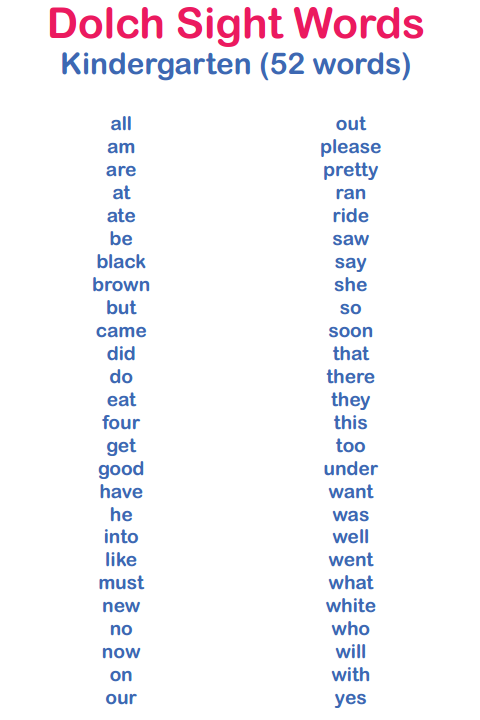sight words kindergarten
Sight words for kindergarten are frequently occurring words that kids learn to recognize quickly. They help build reading fluency and comprehension, focusing less on decoding and more on meaning. Examples include “the,” “and,” “is,” and “in.”
- Sight words kindergarten PDF
- Buy sight words kindergarten
- Ask AI anything about sight words kindergarten
- Related websites
sight words kindergarten PDF

all, am, are, at, ate, be, black, brown, but, came, did, do, eat, four, get, good, have, he, into, like, must, new, no, now, on, our, out, please, pretty, ran, ride, saw, say, she, so, soon, that, there, they, this, too, under, want, was, well, went, what, white, who, will, with, yes
all, am, are, at, ate, be, black, brown, but, came, did, do, eat, four, get, good, have, he, into, like, must, new, no, now, on, our, out, please, pretty, ran, ride, saw, say, she, so, soon, that, there, they, this, too, under, want, was, well, went, what, white, who, will, with, yes
(52 words in total)
Buy sight words kindergarten
BOB Books SIGHT WORDS COLLECTION Book Box Set [Kindergarten & First Grade]: https://amzn.to/3Va0vK9
Ask AI anything about sight words kindergarten
-
Kindergarten sight words: want
“Want” is a common sight word that children are often taught to recognize and read by sight. It is a high-frequency word that appears frequently in texts and is essential for developing reading fluency.
### References:
– Dolch, E. W. (1948). *Problems in Reading*. Champaign, IL: Garrard Press.
– Fry, E. B., & Kress, J. E. (2006). *The Reading Teacher’s Book of Lists* (5th ed.). Jossey-Bass.
-
Kindergarten sight words: under
“Under” is a common sight word that children are often taught early in their reading education. It is a preposition used to indicate a position beneath something else. For example, “The cat is under the table.”
### References:
– Fry, E. B., & Kress, J. E. (2006). *The Reading Teacher’s Book of Lists* (5th ed.). Jossey-Bass.
– Dolch, E. W. (1948). *Problems in Reading*. Southern Illinois University Press.
-
Kindergarten sight words: too
“Too” is a sight word that is commonly taught in early reading programs. It is one of the high-frequency words that children need to recognize quickly and automatically to improve their reading fluency.
### Usage:
– **As an Adverb:** It often means “also” or “in addition.”
– Example: “I want to go, too.”
– **To Indicate Excess:** It can also mean “excessively” or “more than enough.”
– Example: “The water is too hot.”### References:
– Dolch, E. W. (1948). *Problems in Reading*. Champaign, IL: Garrard Press.
– Fry, E. B., & Kress, J. E. (2006). *The Reading Teacher’s Book of Lists* (5th ed.). Jossey-Bass.These references provide foundational information on sight words and their importance in early reading education.
- Kindergarten sight words: the
- Kindergarten sight words: with
- Kindergarten sight words: will
- Kindergarten sight words: who
- Kindergarten sight words: white
- Kindergarten sight words: what
- Kindergarten sight words: went
- Kindergarten sight words: well
- Kindergarten sight words: was
- Kindergarten sight words: want
- Kindergarten sight words: under
- Kindergarten sight words: too
- Kindergarten sight words: this
- Kindergarten sight words: they
- Kindergarten sight words: there
- Kindergarten sight words: that
- Kindergarten sight words: soon
- Kindergarten sight words: so
- Kindergarten sight words: she
- Kindergarten sight words: say
- Kindergarten sight words: saw
- Kindergarten sight words: ride
- Kindergarten sight words: ran
- Kindergarten sight words: pretty
- Kindergarten sight words: please
- Kindergarten sight words: out
- Kindergarten sight words: our
- Kindergarten sight words: on
- Kindergarten sight words: now
- Kindergarten sight words: no
- Kindergarten sight words: new
- Kindergarten sight words: must
- Kindergarten sight words: like
- Kindergarten sight words: into
- Kindergarten sight words: he
- Kindergarten sight words: have
- Kindergarten sight words: good
- Kindergarten sight words: get
- Kindergarten sight words: four
- Kindergarten sight words: eat
- Kindergarten sight words: do
- Kindergarten sight words: did
- Kindergarten sight words: came
- Kindergarten sight words: but
- Kindergarten sight words: brown
- Kindergarten sight words: black
- Kindergarten sight words: be
- Kindergarten sight words: ate
- Kindergarten sight words: at
- Kindergarten sight words: are

![BOB Books SIGHT WORDS COLLECTION Book Box Set [Kindergarten & First Grade]](https://kindergartensightwords.com/wp-content/uploads/2024/12/BOB-Books-SIGHT-WORDS-COLLECTION-Book-Box-Set-Kindergarten-First-Grade.jpg)
